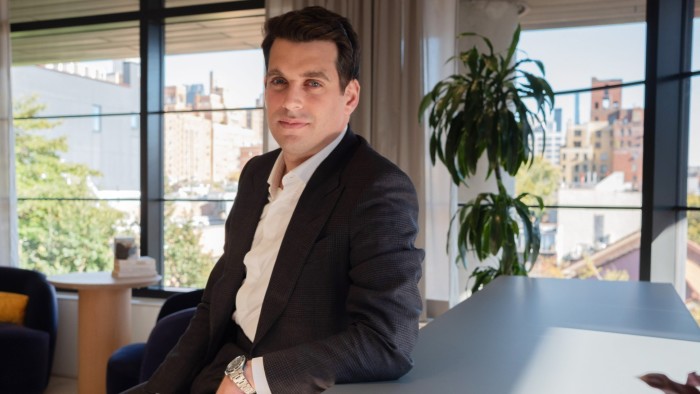The list of investors backing little-known life sciences fund Catalio Capital reads like a roll call of private equity and hedge fund titans. Among them: Thoma Bravo’s Orlando Bravo, Brevan Howard’s Alan Howard, Stanley Druckenmiller and KKR’s Henry Kravis.
How a tiny biotech venture capital fund led by 33-year-old managing partner George Petrocheilos attracted such a kaleidoscope of finance luminaries is a story of equal parts hustle, chutzpah and connections.
It has not hurt that the father of Petrocheilos’s co-founder Jacob Vogelstein is a famed geneticist who has allowed his son’s firm to incubate companies bearing some of his most promising ideas in cancer treatment. Petrocheilos’s pater and mitera were also early-stage investors in Catalio, whose name is the Greek word for “catalyse,” or speed up.
Regardless of how Catalio amassed capital or marshalled resources, the firm’s work is paying off: It has returned more than $300mn to its limited partners in recent years, a rare feat in a tough market.
“This guy will call anybody — that’s the beauty about him,” Kravis said of Petrocheilos in an interview. “There is no one he won’t speak to. It is amazing how many people he has gotten to know over the years who adore him. They have given him money and they continue to give him more money.” KKR recently purchased a minority stake in the group, its first investment in an early-stage life sciences investing fund.
Led by its relentlessly networking Greek-born managing partner Petrocheilos and his co-founder Vogelstein, a scientist who met Petrocheilos while studying at Johns Hopkins University, Catalio has engineered 20 exits since it was founded four years ago. Its assets under management have topped $1.3bn, a speedy ascent in a sector that has struggled to attract new capital in recent years.
Vogelstein plays the role of the “quiet and smart” expert “digging into the science of investments”, while Petrocheilos is the networker and fundraiser with “more energy than an Energizer bunny,” according to Kravis, who serves as Catalio’s chair.
Catalio has managed to ride out a choppy few years in the biotech VC industry, in which firms have struggled against rising interest rates and a shortage of capital available to biotechnology companies spending heavily to develop products with uncertain financial prospects.
Petrocheilos was introduced to Kravis by KKR’s now co-chief executive Joseph Bae, who Petrocheilos first impressed over a 15-minute coffee as a university student. Bae offered an internship; instead Petrocheilos asked Bae to promise to have lunch with him once a year.
“I get many nos,” said Petrocheilos in an interview from Catalio’s office in New York’s Chelsea neighbourhood. “No today means no today, it doesn’t mean no tomorrow. Asking another time and another time is free.” Petrocheilos’s ambition has helped Catalio break into the clubby world of early-stage life science investing, which is dominated by venture capitalists in San Francisco and Cambridge, Massachusetts.
Alongside Petrocheilos’s hustle, Catalio’s other “secret sauce”, Kravis said, came from Vogelstein’s father, Bert, a famed Johns Hopkins researcher, who helped the firm assemble a roster of 45 leading scientists, including several Nobel Prize winners, to advise on potential investments.
The older Vogelstein’s laboratory has been the source of five of the 75 companies in which Catalio has invested, including its biggest exit to date: cancer diagnostics company Thrive, which was bought by Exact Sciences for up to $2.1bn. Vogelstein said he “never” expected to go into business with his son.
“Jacob obviously has the technical and scientific experience that George doesn’t,” said Vogelstein. “George has a large amount of contacts that he’s met, even though he’s young . . . that he has acquired both through his family and his own doing, which has been very valuable. They seem to be an ideal pair.”
Johns Hopkins has also proven to be a valuable network. The firm was first backed by Philippe Laffont, the billionaire founder of hedge fund Coatue Management and the father of a classmate of Petrocheilos and Vogelstein. Laffont, whose son briefly worked at Catalio, then made introductions across the hedge fund industry before eventually selling his stake.
KKR’s investment into Catalio is the latest in a succession of deals whereby private equity firms, including Blackstone, Apollo and Carlyle, which typically invest in large suppliers to the pharmaceutical industry, have bought stakes in biotech venture capital firms making riskier bets on novel treatments.
KKR’s Bae and his co-chief executive Scott Nuttall also have personal investments in the fund, alongside Druckenmiller, former Goldman Sachs chief executive Lloyd Blankfein and Greek basketball star Giannis Antetokounmpo.
Despite only 24 biotechs having listed this year across the whole sector, six of Catalio’s companies, including Arrivent Biopharma and Septerna Therapeutics, have floated. Catalio was also one of the first biotech funds to diversify into private credit, launching a fund co-led by Blankfein’s son Jonathan, an executive at the firm, that has generated annual returns of more than 20 per cent, according to investors.
With Kravis’s guidance, Petrocheilos has also assembled a “board of advisers” that includes major business figures who would not normally advise such a young fund. Members include Alex Gorsky, the former chief of Johnson & Johnson, and Dina Powell McCormick, an ultra-connected former top Goldman Sachs executive who is now a partner at BDT & MSD.
Petrocheilos predicts Catalio’s future may eventually look a lot more like a private equity firm in the healthcare sector, similar to KKR. “We would be open to all that stuff at one point,” said Petrocheilos. For Kravis, the similarities with his firm are impossible to miss: “They remind me of KKR in the early days: we didn’t think too far out, we just did deals.”



